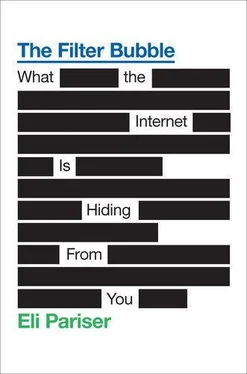231 “the common good”:Arthur Nauman, “News Ombudsmanship: Its Theory and Rationale,” Press Regulation: How Far Has it Come? symposium, Seoul, South Korea, June 1994.
232 that this expectation is one that… most Americans share:Jeffrey Rosen, “The Web Means the End of Forgetting,” New York Times Magazine , July 21, 2010, www.nytimes.com/2010/07/25/magazine/25privacy-t2.html?_r=1&pagewanted=all.
235 “help it find a larger audience”:Author interview with confidential source.
237 Google is just a company:“Transcript: Stephen Colbert Interviews Google’s Eric Schmidt on The Colbert Report, ” Search Engine Land , Sept. 22, 2010, accessed Dec. 20, 2010, http://searchengineland.com/googles-schmidt-colbert-report-51433.
237 expose their audiences to both sides:Cass R. Sunstein, Republic .com (Princeton: Princeton University Press, 2001).
240 “we shouldn’t have to accept”:Caitlin Petre phone interview with Marc Rotenberg, Nov. 5, 2010.
241 and 70 percent do:“Mistakes Do Happen: Credit Report Errors Mean Consumers Lose,” US PIRG, accessed Feb. 8, 2010, http://www.uspirg.org/home/reports/report-archives/financial-privacy–security/financial-privacy-security/mistakes-do-happen-credit-report-errors-mean-consumers-lose.
accessibility bias
Act of Creation, The (Koestler)
Acxiom
Adderall
advertars
advertiser-funded media (AFM)
advertising
augmented reality and
brand fragmentation and
day-parting and
disclosure of personalization in
in social spaces
on television
Afghanistan
agents:
humanlike
intelligent
Alexander, Christopher
algorithms
CineMatch
EdgeRank
Google search
OkCupid
PageRank
political districts and
Amazon
Kindle
Web Services
ambient intelligence
Americans for Job Security
Anderson, Chris
Angleton, James Jesus
anonymity
Anti, Michael
Apple
Newton
architecture and design
Arendt, Hannah
argument styles
Ariely, Dan
Arnold, Stephen
art
Asimov, Isaac
AT&T
Atlantic
attention crash
augmented cognition (AugCog)
augmented reality
Barlow, John Perry
Battelle, John
Bay, Michael
behavioral retargeting
Bell, Gordon
Benkler, Yochai
Berners-Lee, Tim
Bezos, Jeff
Bharat, Krishna
Bhat, Tapan
Bing
Bishop, Bill
Blades, Joan
blogs
BlueCava
BlueKai
Bohm, David
Bohr, Niels
books
advertising in
digitized
Bosworth, Andrew
Bowling Alone (Putnam)
boyd, danah
Boyd, Wes
BP
brain
Brand, Stewart
brand fragmentation
bridges
Brin, Sergey
Burnham, Brad
Burnham, Terence
Bush, George W.
Bush, Vannevar
Buzzfeed
California
Calo, Ryan
Campbell, Donald
Caro, Robert A.
Catalist
categories, wide
censorship
Chait, Jon
China
Internet police in
Pabst in
CIA
CineMatch
cities
architecture and design in
Clarium
click signals
Clinton, Bill
cloud
Coca-Cola Village Amusement Park
code and programmers
coding, conceptual
Cohen, Claudia
Cohler, Matt
Coleman, Gabriella
collaborative filtering
confirmation bias
Conley, Dalton
cookies
Cortés, Hernán
Coyne, Chris
craigslist
creativity and innovation
credit reports
Cropley, Arthur
curators, see editors and curators
curiosity
cybernetics
DARPA
data laundering
dating sites
OkCupid
day-parting
De Castro, Henrique
defaults
democracy
dialogue and
design and architecture
Dewey, John
dialogue
Digg
DirectLife
discovery
disintermediation
Dixon, Pam
DNA
Do Not Track list
Dostoyevsky, Fyodor
Downey, Tom
Duncker, Karl
Dyson, Esther
EchoMetrix
Eckles, Dean
EdgeRank
editors and curators
Eliza
e-mail
constitutional protections and
Gmail
engineers
Erowid
Europe
evolution
Eysenck, Hans
Facebook
advertisements and
EdgeRank and
Everywhere
Google and
identity and
Like button on
local-maximum problem and
lock-in and
News Feeds on
political advertising and
political involvement and
privacy policy of
Twitter compared with
facial recognition
Fair Credit Reporting Act
Fair Information Practices
Fallows, James
Farah, Martha
FBI
Flatow, Alfred
Foer, Josh
Foisie, Philip
Founder’s Fund
Foursquare
France
Fried, Charles
Friedman, Patri
Friedman, Tom
friendly world syndrome
Friendster
From Counterculture to Cyberculture (Turner)
fundamental attribution error
Gawker
geeks
Gelernter, David
Gellman, Robert
genetic data
Gerbner, George
Gibson, William
Gilbert, Dan
Glass, Ira
Gmail
Google
China and
dashboard of
digitized books and
Docs
“Don’t be evil” slogan of
ethics and
Facebook and
facial recognition and
Gmail
Instant
lock-in and
News
Oceana and
PageRank
Picasa
political advertising and
political involvement and
Reader
Research
search algorithm of
Translate
Voice
government
Graber, Doris
gun registration
Habermas, Jurgen
Hackers (Levy)
hackers, hacking
Hare, Brian
Harris, Vincent
Hastings, Reed
Hauser, John
Hayes, Gary
Heiferman, Scott
Heuer, Richards
Hillis, Danny
Hoekstra, Pete
Huffington Post
humanlike agents
Hume, David
IBM
identity
identity loops
induction
infomercials
information gap
Inglehart, Ron
Institute
intelligent agents
Interactive Advertising Bureau (IAB)
iPhone
IQ
Iraq
i-traffic
iTunes
Iyengar, Shanto
jet pilots
Jiang Zemin
Jobs, Steve
Johnson, Steven
Joy, Bill
Kaczinski, Ted
Kafka, Franz
Kalathil, Shanthi
Kane, Patrick
Kantorovich, Aharon
Katona, George
Kayak
Kazmaier, Dick
Kekule, Friedrich
Keller, Bill
Kelly, Kevin
Kennedy, John F.
Kirkpatrick, David
Klein, Paul
Koestler, Arthur
Kranzberg, Melvin
Krohn, Max
Kwan, Julianne
language translation
Lanier, Jaron
Last Question, The (Asimov)
LeanBack
learning
machine
least objectionable programming
Lee, Kai-Fu
Lessig, Larry
Levy, Steven
Lewis, Andrew
Liberty and the News (Lippmann)
Liebling, A. J.
LinkedIn
Linux
Lippmann, Walter
Livingston, Jessica
local-maximum problem
lock-in
“Long Live the Web” (Berners-Lee)
Loopt
Lovell, Todd
Lowenstein, George
luck
Lynch, Zack
Ma, Jack
MacDougald, Harry
machine learning
Mancini, Paul
Mark, David
Mayer, Marissa
Mayer-Schonberger, Viktor
McLarty, Mack
McLuhan, Marshall
McPhie, Jonathan
Meadowlands
Читать дальше











